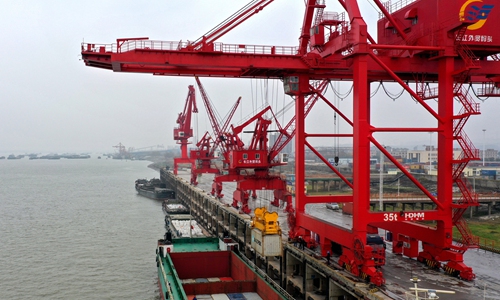HOME >> SOURCE
China’s foreign trade expands 3.4% in 2019 despite trade tensions with US
By Chu Daye and Ma Jingjing Source:Global Times Published: 2020/1/14 11:02:57

Cranes load and unload containers at a port in Tongling, East China's Anhui Province. Under the guidance of the China-proposed Belt and Road Initiative, the city adjusted its industrial structure and achieved growth in foreign trade in 2019. Photo: cnsphoto
China posted stronger foreign trade growth in 2019 by expanding 3.4 percent year-on-year, the General Administration of Customs (GAC) said Tuesday.
Last year saw China's total foreign trade volume reached 31.54 trillion yuan ($4.58 trillion).
Exports climbed 5 percent year-on-year to 17.23 trillion yuan, while imports hit 14.31 trillion yuan, the data showed.
Besides, China also saw its trade surplus widen by 25.4 percent year-on-year to 2.92 trillion yuan in 2019.
Chinese government's measures to stabilize foreign trade have yielded a surge in exports at the year-end, while the growth is also in part attributed to a lower comparison base in 2018, Bai Ming, deputy director of the Ministry of Commerce's International Market Research Institute, told the Global Times.
Meanwhile, import growth reflected a soar in domestic demands amid promising domestic economic growth, Bai said.
China is scheduled to unveil its fourth-quarter and the GDP figures of 2019 on Friday.
In 2019, China's trade with the EU, its largest trading partner, grew by 8 percent to 4.86 trillion yuan. Last year, the Association of Southeast Asian Nations (ASEAN) became China's second-largest trading partner. ASEAN's trade with China grew by 14.1 percent to 4.43 trillion yuan, while China-US trade fell by 10.7 percent to 3.73 trillion yuan.
Though China and the US are expected to sign a phase one trade deal in Washington on Wednesday, Bai cautioned against high optimism about foreign trade growth for 2020.
"Phase two trade negotiations will start soon, and US President Donald Trump may leverage on the already finalized agreements and pressure China to accept certain concessions," he said, noting that the upcoming trade talks will be more complex and the two countries' disputes will be more difficult to be resolved.
Posted in: ECONOMY